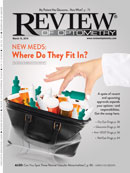With their widespread use today, it’s easy to forget that anti-VEGF injections are a relatively new therapeutic option (the first FDA approval came in 2004), and that some of their safety issues are still under investigation.1
For instance, a study recently published in the American Journal of Ophthalmology retrospectively evaluated the electronic records of a large academic private practice to determine the rate of unilateral and bilateral post-injection endophthalmitis after bilateral same-day intravitreal anti-VEGF injections.2 The Philadelphia-based researchers examined all office visits during which bilateral intravitreal anti-VEGF injections were performed between April 1, 2012, and August 21, 2017 for patients with a diagnosis of neovascular age-related macular degeneration (54.3% of patients), diabetic macular edema (35.4%) or retinal vein occlusion. The team gathered records from 101,932 injections.2
The research found only 28 (0.028%) cases of endophthalmitis and zero cases of bilateral infection. The conclusion is pretty clear: bilateral same-day intravitreal anti-VEGF treatment doesn’t significantly contribute to the rate of endophthalmitis.2
| 1. Macugen Approval History. www.drugs.com/history/macugen.html June 4, 2018. Accessed July 23, 2018. |

